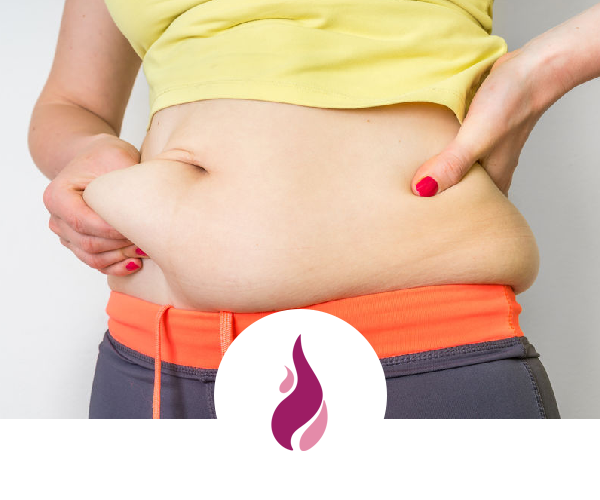Menopausal weight gain

Have you noticed your clothes are feeling tighter around your middle and your waist seems to have been replaced by a muffin top spilling over your jeans? Welcome to the world of menopausal middle-aged spread!
Our distribution of weight changes as hormone levels fluctuate through menopause and lower levels of oestrogen lead to us becoming more apple than pear-shaped, which isn’t good for our health or our body confidence.
So why does this happen and is there anything you can about it?
After menopause, oestrogen stops being made in the ovaries and a weaker form of oestrogen (oestrone) is produced in fat cells. As you’re trying to compensate for this dip, your body starts to produce more fat and the pounds are quickly piled on.
Exercise plays a huge part in keeping your weight down and abdominal fat at bay – not just by burning calories but also by reducing the ‘inflammation’ this type of fat causes within our bodies. It is this inflammation – which we can’t see or feel – that leads to a higher risk of type 2 diabetes, heart disease and some cancers.
What sort of exercise works best?
Well firstly any sort of exercise is good – so find something you love doing and do it regularly. But don’t think that just doing sit-ups will do the trick; they’re not the best exercise for toning tums and, sadly, spot-reducing isn’t realistic either. But the good news is that we can change the appearance of our midriff to look more toned by reducing fat and increasing lean tissue. The best way to do this is with resistance exercises so we get stronger and leaner. Muscle cells are the powerhouse of the body and they use far more energy than fat cells, so by improving muscle density you can burn more calories throughout the day, even when you’re asleep.
Resistance exercises simply mean that you’re using weights, bands or your own bodyweight to lift, push or pull against a load – you don’t have to go to the gym, unless you want to of course.
Lifting heavy bags of shopping, pushing a lawn-mower (non-motorised), carrying babies and toddlers, even running up stairs all count. But to make a significant impact you need to do resistance exercises 2 or 3 times a week (have a day off in-between each session).
Progression is key as your body quickly adapts so unless you keep adding a few more repetitions (reps) or increasing the load you won’t get the desired results. Whether you’re doing squats (with or without hand-weights), push-ups (standing or on your knees) or the plank, you have to do more reps or hold for longer every time you feel it’s getting easier. For example, you might start with 10 squats and build up to do 3 sets of 10 reps or build up from 30 seconds to 2 minutes.
Set yourself mini goals so they are achievable and track your progress. Jot down what you do each time and just watch how quickly you improve.
Rather than just focusing on weight loss, aim to reduce your waist measurement instead. Make sure you measure in the same place each time by measuring at your natural waistline just above your belly button and below your rib cage. If you bend to the side, the crease that forms is your natural waistline. You’ll soon notice when your clothes don’t feel like they’ve shrunk in the wash, but if you do want to work towards a specific goal then bear in mind that the ideal waist measurement for good health is under 32”; 32-35” is overweight and over 35” is classed as obese.
We may never regain the waist we had in our 20s but we can improve muscle tone by combining exercise with a healthy diet. This is a huge topic which we’ll cover in other blogs but do remember that crash diets may work in the short term but you also risk losing muscle as well as fat and going into starvation mode which causes metabolism to slow down. You need to find a way of eating healthily that suits you and is sustainable in the long term.
And have you considered how night sweats might be impacting upon your weight gain by interrupting your sleep? 2008 research published in the International Journal of Obesity links sleeping less than five hours per night to abdominal fat gain. Subsequent research has identified that poor sleep can increase levels of the stress hormone cortisol, which increases the tendency to store fat around the waist. So poor sleep can increase your appetite, cravings for high-calorie and high-fat foods and the tendency to overeat. Find out how you can improve your sleep here.